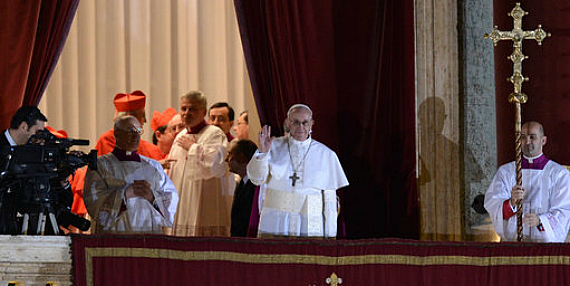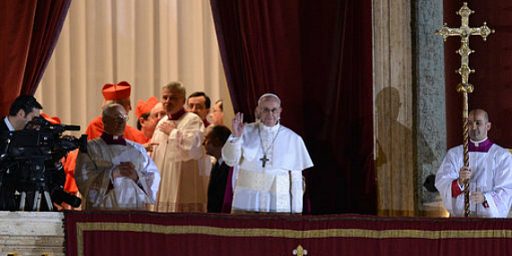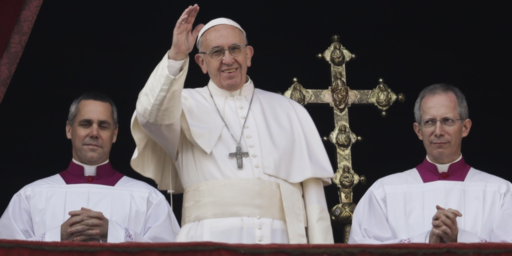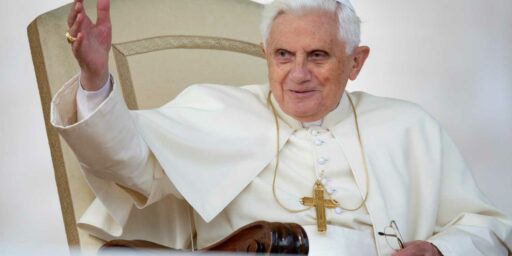NSA Spied On Pope Francis During Papal Conclave?
A report out today claims today that the National Security Agency was monitoring communications between then Archbishop Jorge Mario Bergoglio and others during the Conclave earlier this year at which he was selected as the new Pope of the Roman Catholic Church:
The National Security Agency spied on the future Pope Francis before and during the Vatican conclave at which he was chosen to succeed Benedict XVI, it was claimed on Wednesday.
The American spy agency monitored telephone calls made to and from the residence in Rome where the then Archbishop Jorge Mario Bergoglio stayed during the conclave, the secret election at which cardinals chose him as pontiff on March 13.
The claims were made by Panorama, an Italian weekly news magazine, which said that the NSA monitored the telephone calls of many bishops and cardinals at the Vatican in the lead-up to the conclave, which was held amid tight security in the Sistine Chapel.
The information gleaned was then reportedly divided into four categories — “leadership intentions”, “threats to financial system”, “foreign policy objectives” and “human rights”.
At that time, Benedict XVI was Pope, suggesting that the Vatican may also have been monitored during the last few weeks of his papacy.
The allegations follow a report on Cryptome, a website that gathers intelligence on surveillance and national security, which claimed the US intercepted 46 million telephone calls in Italy between Dec 10 2012 and Jan 8 January 2013.
The monitoring of communications, including emails, continued after Benedict’s resignation in February and encompassed the election of Pope Francis.
“It is feared that the great American ear continued to tap prelates’ conversations up to the eve of the conclave,” the weekly magazine said.
It added that there were “suspicions that the conversations of the future Pope may have been monitored”, but provided no hard evidence or quoted sources for the claim.
Archbishop Bergoglio was of interest to US diplomats and intelligence agencies as far back as 2005, when he was mentioned as a possible candidate for the papacy after the death of John Paul II.
The Vatican has dismissed the reports and, of course, there’s no comment from the United States. On the surface, it’s unclear why the United States would be so interested in Vatican communications in general or why the NSA would go through with the effort to target Bergoglio specifically, especially since his name really wasn’t high on many people’s list of “Papable” Cardinals prior to the time that the College of Cardinals began its deliberations. It’s also worth noting that Ed Morrissey, who was reporting from Rome for the entirety of the Conclave, cautions against taking this particular news magazine at its word. Nonetheless, if this is true, I’d say its more a reflection of an agency that has grown too big for its britches than anything else. Spying on the Vatican really sounds like one of those “Hey, we can do this so why not give it a try” things that may have been engaged in despite the fact that there wouldn’t appear on the surface to be any value to the information collected.






They are spies – they do it because they can.
That’s the thing about intelligence gathering; any single piece of information on it’s own may appear to be worthless, but when meshed with other data (that you’re not aware of) it may very well be vital.
The point is, you don’t have enough information (or expertise) to make an informed decision about whether or not this surveillance had value.
I’m a lot more upset about our government spying on me than I am about them spying on world leaders. Heads of state have been spying on each other pretty much forever.
I understand the NSA budget come largely from betting on the outcomes of events like the choice of a Pope. They laid down a couple of c-notes, paid off at 20 to 1.
It would be impressive if they manipulated the outcome.
You can’t see why the US would be interested in an organization engaged in ongoing criminal conspiracies?
Interesting…..
@rudderpedals:
People would have been suspicious of Pope Bieber I.
Pope John Paul had a large role in the end of the Cold War. Pius VI had a tangled relationship with the 3d Reich. Italy is a leading Mediterranean nation. Just off the top of my head, three reasons that an intelligence service would have some interest in the Papal Conclave.
Look at it this way: Do YOU trust The Vatican?
The Holy See (which is distinct from the Vatican city-state) has had diplomatic relations with more countries for more centuries than any other nation or international organization. It is often involved in mediating disputes and preventing wars. It makes perfect sense that the NSA would target its communications.
However, unless the NSA has linguists proficient in the obscure and ancient biblical dialects taught to the Holy See’s diplomats, any content they wish to keep private will likely remain so.